Effective Talent Management Strategies Research Report
VerifiedAdded on 2022/12/28
|26
|5115
|120
Report
AI Summary
This research project investigates the significance of talent management strategies in enhancing employee performance within an organization. The study employs a mixed-methods approach, utilizing the research onion framework, positivism philosophy, deductive research approach, and a survey methodology with questionnaires to gather primary data. The research focuses on understanding the role of talent management in attracting, motivating, and retaining employees, as well as its impact on business performance and customer satisfaction. The findings, analyzed through thematic analysis, reveal the importance of talent management for employee understanding, engagement, and retention. The report explores various talent management strategies such as detailed job descriptions, person-organization fit, and rewards. The research offers recommendations for implementing effective talent management practices to improve employee experience, maximize organizational performance, and reduce turnover. The report also includes a discussion of the challenges faced during the implementation of talent management strategies, along with the advantages companies can gain from effective talent management.
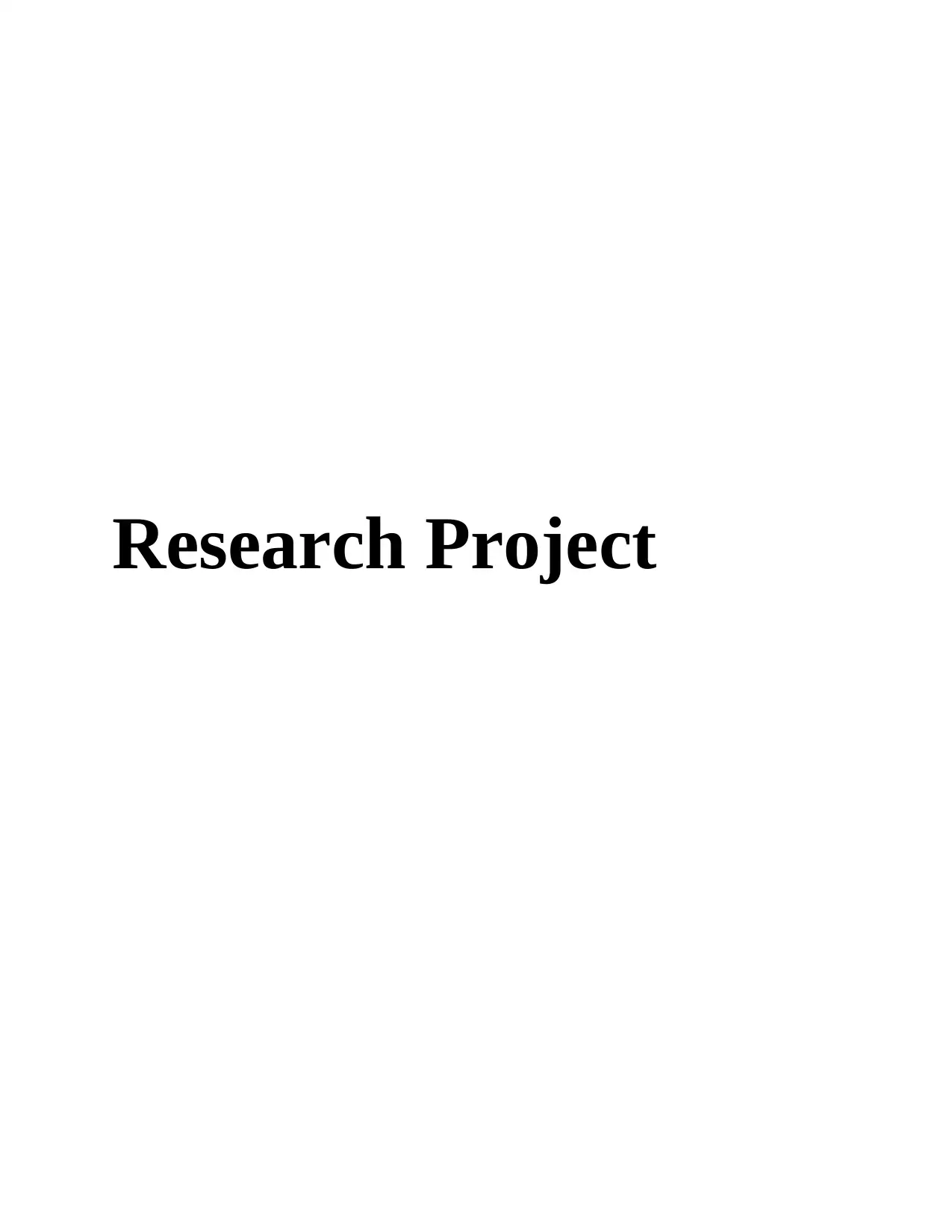
Research Project
Paraphrase This Document
Need a fresh take? Get an instant paraphrase of this document with our AI Paraphraser
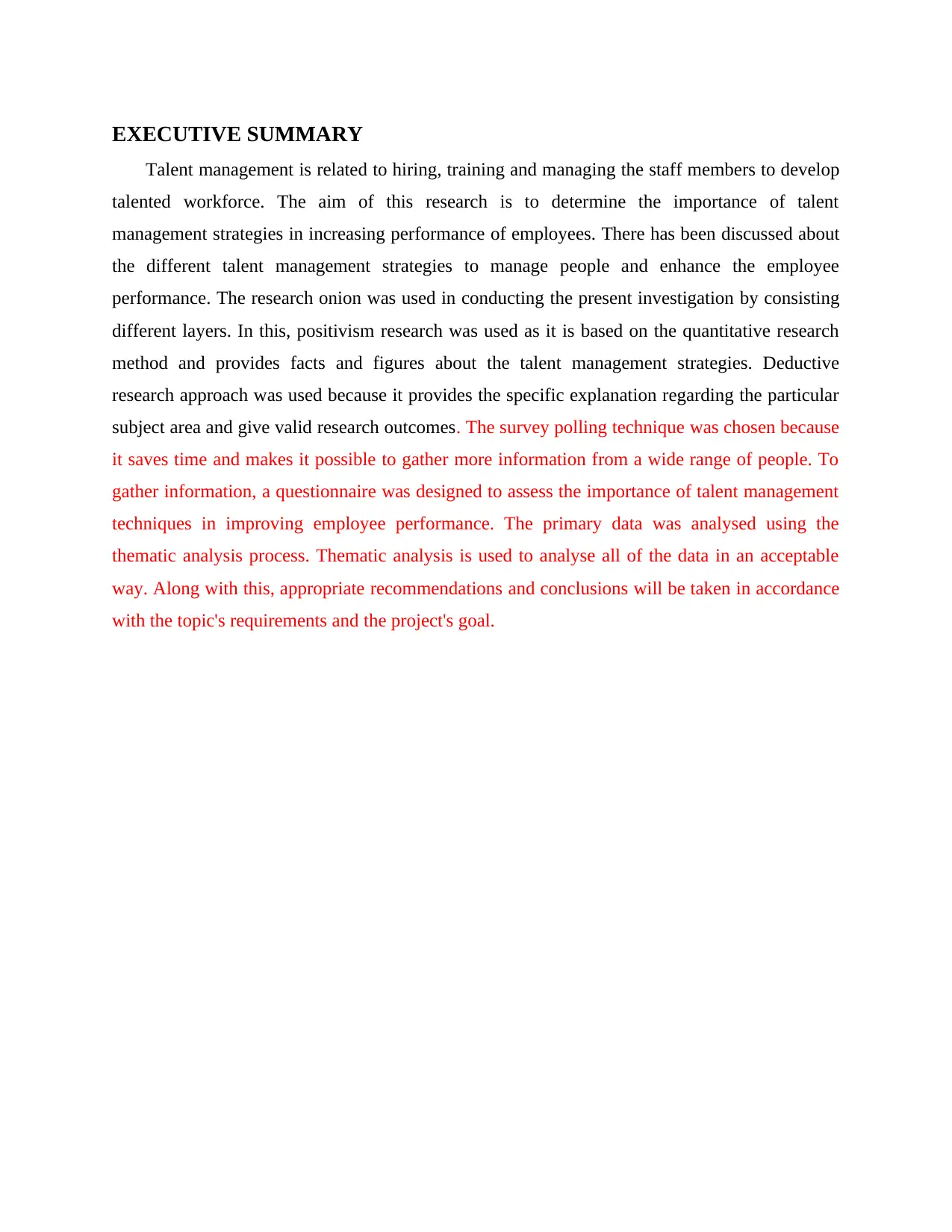
EXECUTIVE SUMMARY
Talent management is related to hiring, training and managing the staff members to develop
talented workforce. The aim of this research is to determine the importance of talent
management strategies in increasing performance of employees. There has been discussed about
the different talent management strategies to manage people and enhance the employee
performance. The research onion was used in conducting the present investigation by consisting
different layers. In this, positivism research was used as it is based on the quantitative research
method and provides facts and figures about the talent management strategies. Deductive
research approach was used because it provides the specific explanation regarding the particular
subject area and give valid research outcomes. The survey polling technique was chosen because
it saves time and makes it possible to gather more information from a wide range of people. To
gather information, a questionnaire was designed to assess the importance of talent management
techniques in improving employee performance. The primary data was analysed using the
thematic analysis process. Thematic analysis is used to analyse all of the data in an acceptable
way. Along with this, appropriate recommendations and conclusions will be taken in accordance
with the topic's requirements and the project's goal.
Talent management is related to hiring, training and managing the staff members to develop
talented workforce. The aim of this research is to determine the importance of talent
management strategies in increasing performance of employees. There has been discussed about
the different talent management strategies to manage people and enhance the employee
performance. The research onion was used in conducting the present investigation by consisting
different layers. In this, positivism research was used as it is based on the quantitative research
method and provides facts and figures about the talent management strategies. Deductive
research approach was used because it provides the specific explanation regarding the particular
subject area and give valid research outcomes. The survey polling technique was chosen because
it saves time and makes it possible to gather more information from a wide range of people. To
gather information, a questionnaire was designed to assess the importance of talent management
techniques in improving employee performance. The primary data was analysed using the
thematic analysis process. Thematic analysis is used to analyse all of the data in an acceptable
way. Along with this, appropriate recommendations and conclusions will be taken in accordance
with the topic's requirements and the project's goal.
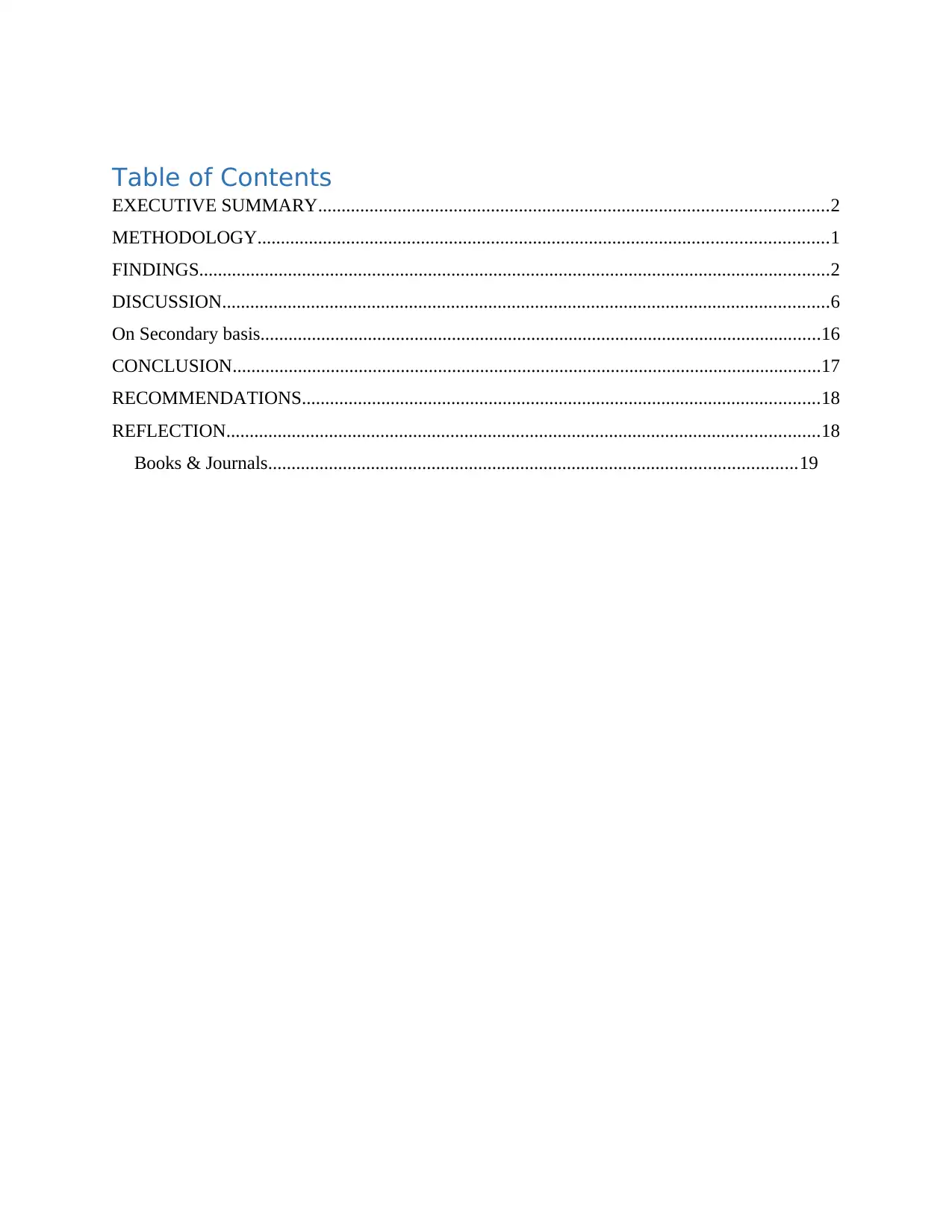
Table of Contents
EXECUTIVE SUMMARY.............................................................................................................2
METHODOLOGY..........................................................................................................................1
FINDINGS.......................................................................................................................................2
DISCUSSION..................................................................................................................................6
On Secondary basis........................................................................................................................16
CONCLUSION..............................................................................................................................17
RECOMMENDATIONS...............................................................................................................18
REFLECTION...............................................................................................................................18
Books & Journals.................................................................................................................19
EXECUTIVE SUMMARY.............................................................................................................2
METHODOLOGY..........................................................................................................................1
FINDINGS.......................................................................................................................................2
DISCUSSION..................................................................................................................................6
On Secondary basis........................................................................................................................16
CONCLUSION..............................................................................................................................17
RECOMMENDATIONS...............................................................................................................18
REFLECTION...............................................................................................................................18
Books & Journals.................................................................................................................19
⊘ This is a preview!⊘
Do you want full access?
Subscribe today to unlock all pages.

Trusted by 1+ million students worldwide
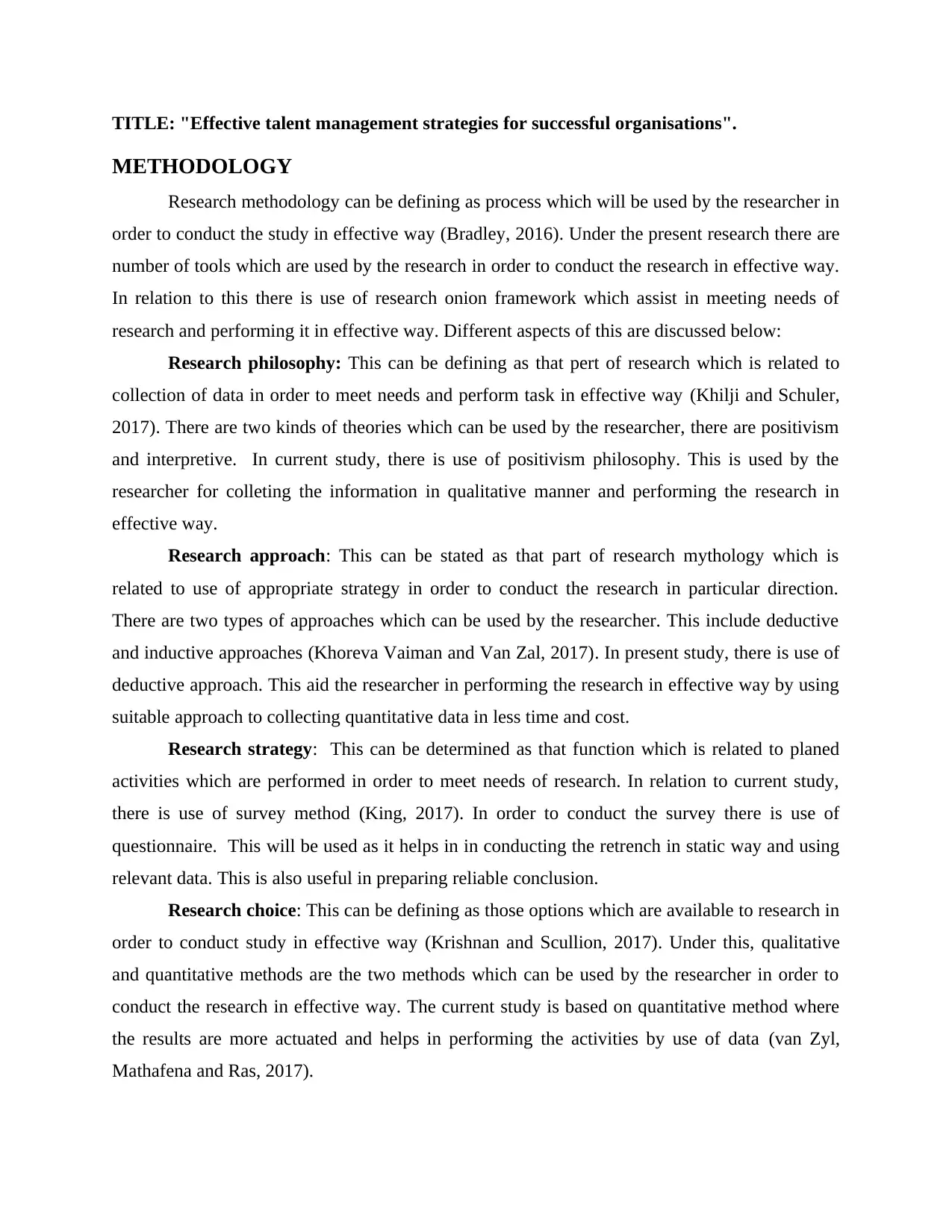
TITLE: "Effective talent management strategies for successful organisations".
METHODOLOGY
Research methodology can be defining as process which will be used by the researcher in
order to conduct the study in effective way (Bradley, 2016). Under the present research there are
number of tools which are used by the research in order to conduct the research in effective way.
In relation to this there is use of research onion framework which assist in meeting needs of
research and performing it in effective way. Different aspects of this are discussed below:
Research philosophy: This can be defining as that pert of research which is related to
collection of data in order to meet needs and perform task in effective way (Khilji and Schuler,
2017). There are two kinds of theories which can be used by the researcher, there are positivism
and interpretive. In current study, there is use of positivism philosophy. This is used by the
researcher for colleting the information in qualitative manner and performing the research in
effective way.
Research approach: This can be stated as that part of research mythology which is
related to use of appropriate strategy in order to conduct the research in particular direction.
There are two types of approaches which can be used by the researcher. This include deductive
and inductive approaches (Khoreva Vaiman and Van Zal, 2017). In present study, there is use of
deductive approach. This aid the researcher in performing the research in effective way by using
suitable approach to collecting quantitative data in less time and cost.
Research strategy: This can be determined as that function which is related to planed
activities which are performed in order to meet needs of research. In relation to current study,
there is use of survey method (King, 2017). In order to conduct the survey there is use of
questionnaire. This will be used as it helps in in conducting the retrench in static way and using
relevant data. This is also useful in preparing reliable conclusion.
Research choice: This can be defining as those options which are available to research in
order to conduct study in effective way (Krishnan and Scullion, 2017). Under this, qualitative
and quantitative methods are the two methods which can be used by the researcher in order to
conduct the research in effective way. The current study is based on quantitative method where
the results are more actuated and helps in performing the activities by use of data (van Zyl,
Mathafena and Ras, 2017).
METHODOLOGY
Research methodology can be defining as process which will be used by the researcher in
order to conduct the study in effective way (Bradley, 2016). Under the present research there are
number of tools which are used by the research in order to conduct the research in effective way.
In relation to this there is use of research onion framework which assist in meeting needs of
research and performing it in effective way. Different aspects of this are discussed below:
Research philosophy: This can be defining as that pert of research which is related to
collection of data in order to meet needs and perform task in effective way (Khilji and Schuler,
2017). There are two kinds of theories which can be used by the researcher, there are positivism
and interpretive. In current study, there is use of positivism philosophy. This is used by the
researcher for colleting the information in qualitative manner and performing the research in
effective way.
Research approach: This can be stated as that part of research mythology which is
related to use of appropriate strategy in order to conduct the research in particular direction.
There are two types of approaches which can be used by the researcher. This include deductive
and inductive approaches (Khoreva Vaiman and Van Zal, 2017). In present study, there is use of
deductive approach. This aid the researcher in performing the research in effective way by using
suitable approach to collecting quantitative data in less time and cost.
Research strategy: This can be determined as that function which is related to planed
activities which are performed in order to meet needs of research. In relation to current study,
there is use of survey method (King, 2017). In order to conduct the survey there is use of
questionnaire. This will be used as it helps in in conducting the retrench in static way and using
relevant data. This is also useful in preparing reliable conclusion.
Research choice: This can be defining as those options which are available to research in
order to conduct study in effective way (Krishnan and Scullion, 2017). Under this, qualitative
and quantitative methods are the two methods which can be used by the researcher in order to
conduct the research in effective way. The current study is based on quantitative method where
the results are more actuated and helps in performing the activities by use of data (van Zyl,
Mathafena and Ras, 2017).
Paraphrase This Document
Need a fresh take? Get an instant paraphrase of this document with our AI Paraphraser
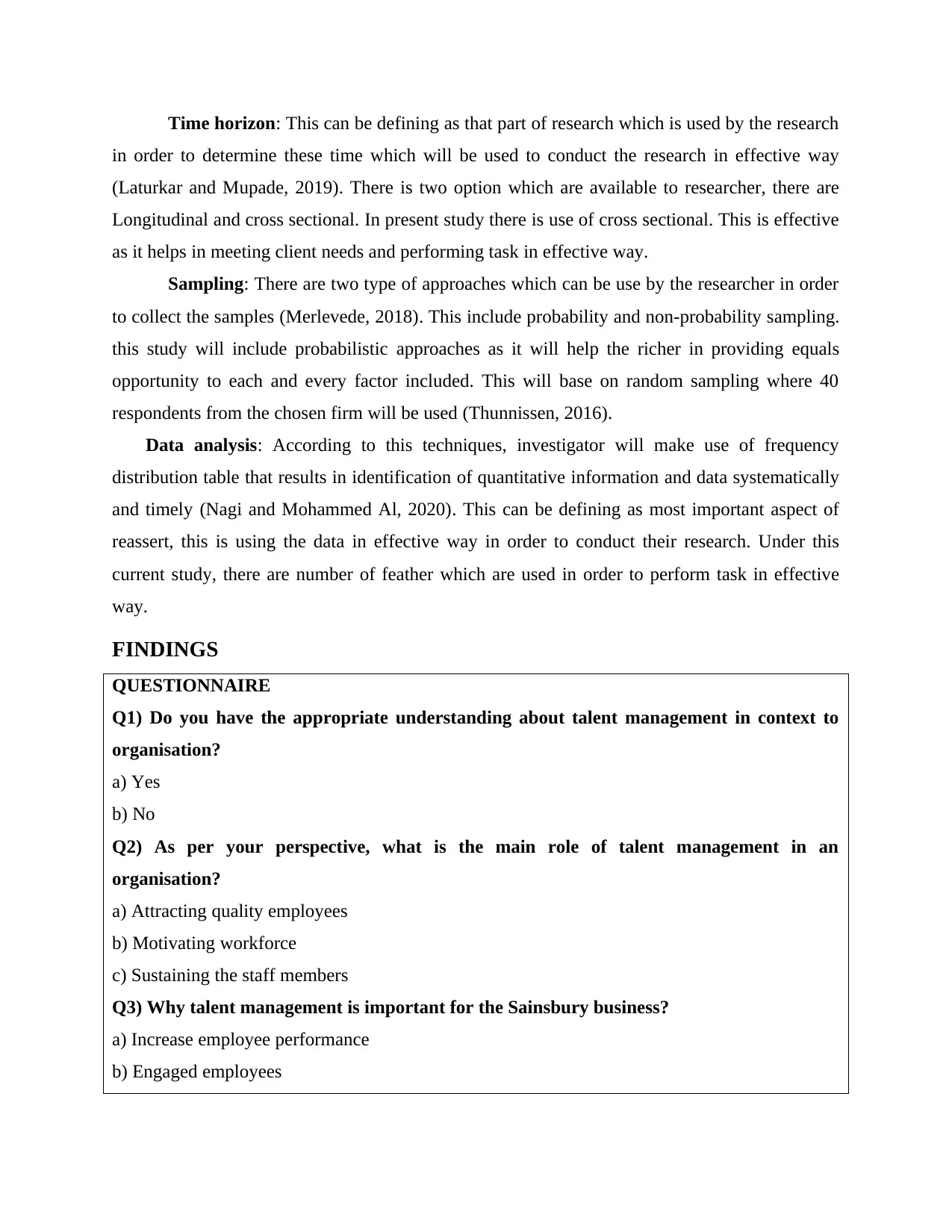
Time horizon: This can be defining as that part of research which is used by the research
in order to determine these time which will be used to conduct the research in effective way
(Laturkar and Mupade, 2019). There is two option which are available to researcher, there are
Longitudinal and cross sectional. In present study there is use of cross sectional. This is effective
as it helps in meeting client needs and performing task in effective way.
Sampling: There are two type of approaches which can be use by the researcher in order
to collect the samples (Merlevede, 2018). This include probability and non-probability sampling.
this study will include probabilistic approaches as it will help the richer in providing equals
opportunity to each and every factor included. This will base on random sampling where 40
respondents from the chosen firm will be used (Thunnissen, 2016).
Data analysis: According to this techniques, investigator will make use of frequency
distribution table that results in identification of quantitative information and data systematically
and timely (Nagi and Mohammed Al, 2020). This can be defining as most important aspect of
reassert, this is using the data in effective way in order to conduct their research. Under this
current study, there are number of feather which are used in order to perform task in effective
way.
FINDINGS
QUESTIONNAIRE
Q1) Do you have the appropriate understanding about talent management in context to
organisation?
a) Yes
b) No
Q2) As per your perspective, what is the main role of talent management in an
organisation?
a) Attracting quality employees
b) Motivating workforce
c) Sustaining the staff members
Q3) Why talent management is important for the Sainsbury business?
a) Increase employee performance
b) Engaged employees
in order to determine these time which will be used to conduct the research in effective way
(Laturkar and Mupade, 2019). There is two option which are available to researcher, there are
Longitudinal and cross sectional. In present study there is use of cross sectional. This is effective
as it helps in meeting client needs and performing task in effective way.
Sampling: There are two type of approaches which can be use by the researcher in order
to collect the samples (Merlevede, 2018). This include probability and non-probability sampling.
this study will include probabilistic approaches as it will help the richer in providing equals
opportunity to each and every factor included. This will base on random sampling where 40
respondents from the chosen firm will be used (Thunnissen, 2016).
Data analysis: According to this techniques, investigator will make use of frequency
distribution table that results in identification of quantitative information and data systematically
and timely (Nagi and Mohammed Al, 2020). This can be defining as most important aspect of
reassert, this is using the data in effective way in order to conduct their research. Under this
current study, there are number of feather which are used in order to perform task in effective
way.
FINDINGS
QUESTIONNAIRE
Q1) Do you have the appropriate understanding about talent management in context to
organisation?
a) Yes
b) No
Q2) As per your perspective, what is the main role of talent management in an
organisation?
a) Attracting quality employees
b) Motivating workforce
c) Sustaining the staff members
Q3) Why talent management is important for the Sainsbury business?
a) Increase employee performance
b) Engaged employees
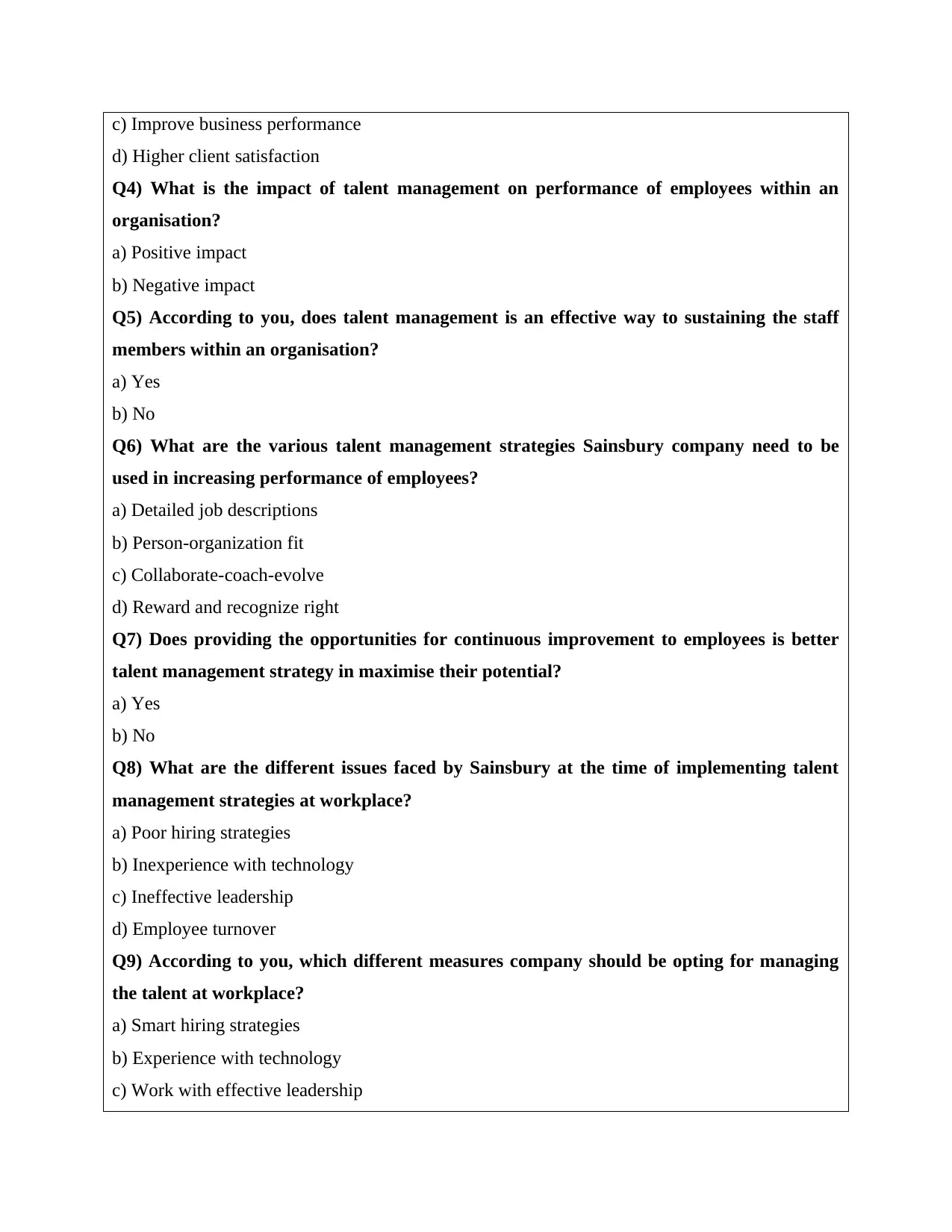
c) Improve business performance
d) Higher client satisfaction
Q4) What is the impact of talent management on performance of employees within an
organisation?
a) Positive impact
b) Negative impact
Q5) According to you, does talent management is an effective way to sustaining the staff
members within an organisation?
a) Yes
b) No
Q6) What are the various talent management strategies Sainsbury company need to be
used in increasing performance of employees?
a) Detailed job descriptions
b) Person-organization fit
c) Collaborate-coach-evolve
d) Reward and recognize right
Q7) Does providing the opportunities for continuous improvement to employees is better
talent management strategy in maximise their potential?
a) Yes
b) No
Q8) What are the different issues faced by Sainsbury at the time of implementing talent
management strategies at workplace?
a) Poor hiring strategies
b) Inexperience with technology
c) Ineffective leadership
d) Employee turnover
Q9) According to you, which different measures company should be opting for managing
the talent at workplace?
a) Smart hiring strategies
b) Experience with technology
c) Work with effective leadership
d) Higher client satisfaction
Q4) What is the impact of talent management on performance of employees within an
organisation?
a) Positive impact
b) Negative impact
Q5) According to you, does talent management is an effective way to sustaining the staff
members within an organisation?
a) Yes
b) No
Q6) What are the various talent management strategies Sainsbury company need to be
used in increasing performance of employees?
a) Detailed job descriptions
b) Person-organization fit
c) Collaborate-coach-evolve
d) Reward and recognize right
Q7) Does providing the opportunities for continuous improvement to employees is better
talent management strategy in maximise their potential?
a) Yes
b) No
Q8) What are the different issues faced by Sainsbury at the time of implementing talent
management strategies at workplace?
a) Poor hiring strategies
b) Inexperience with technology
c) Ineffective leadership
d) Employee turnover
Q9) According to you, which different measures company should be opting for managing
the talent at workplace?
a) Smart hiring strategies
b) Experience with technology
c) Work with effective leadership
⊘ This is a preview!⊘
Do you want full access?
Subscribe today to unlock all pages.

Trusted by 1+ million students worldwide
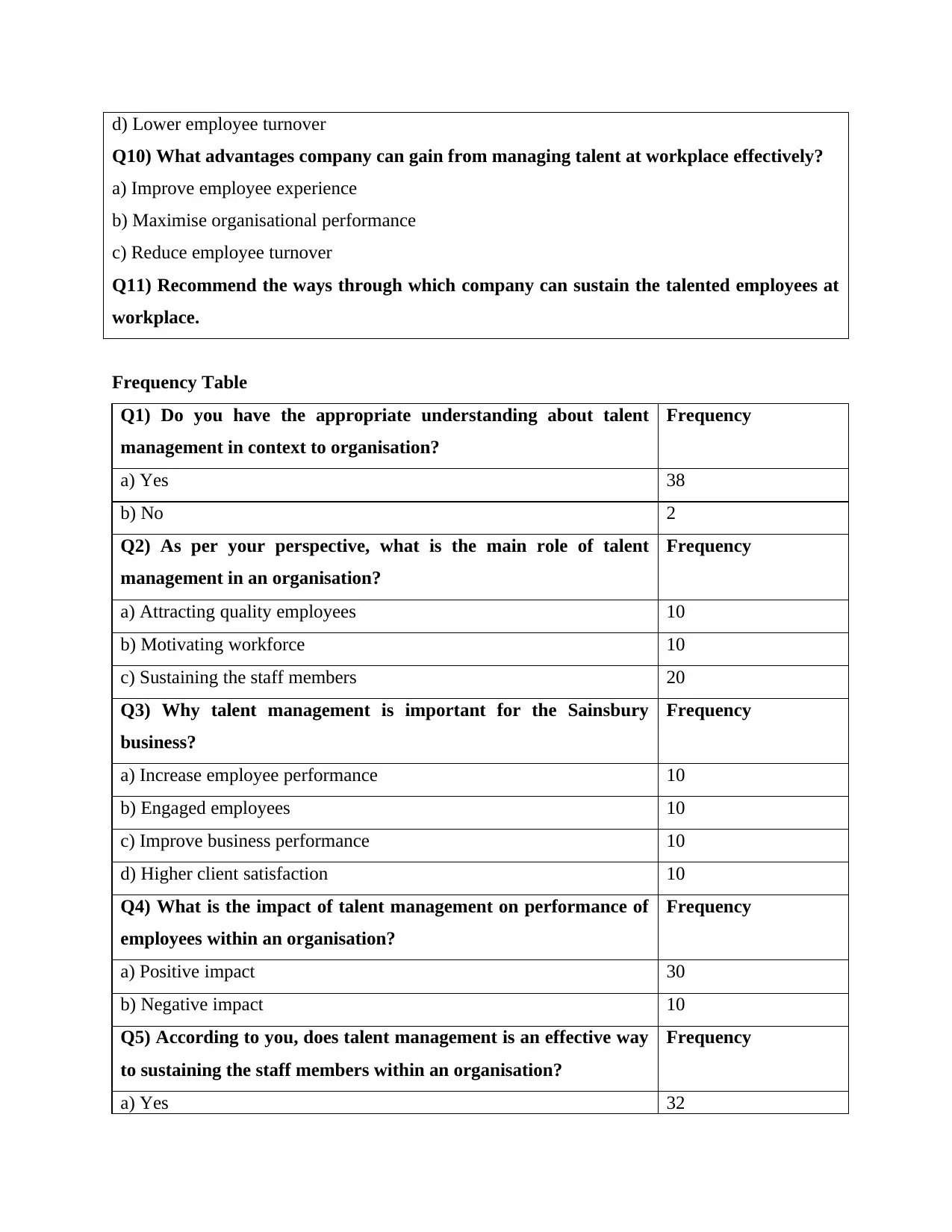
d) Lower employee turnover
Q10) What advantages company can gain from managing talent at workplace effectively?
a) Improve employee experience
b) Maximise organisational performance
c) Reduce employee turnover
Q11) Recommend the ways through which company can sustain the talented employees at
workplace.
Frequency Table
Q1) Do you have the appropriate understanding about talent
management in context to organisation?
Frequency
a) Yes 38
b) No 2
Q2) As per your perspective, what is the main role of talent
management in an organisation?
Frequency
a) Attracting quality employees 10
b) Motivating workforce 10
c) Sustaining the staff members 20
Q3) Why talent management is important for the Sainsbury
business?
Frequency
a) Increase employee performance 10
b) Engaged employees 10
c) Improve business performance 10
d) Higher client satisfaction 10
Q4) What is the impact of talent management on performance of
employees within an organisation?
Frequency
a) Positive impact 30
b) Negative impact 10
Q5) According to you, does talent management is an effective way
to sustaining the staff members within an organisation?
Frequency
a) Yes 32
Q10) What advantages company can gain from managing talent at workplace effectively?
a) Improve employee experience
b) Maximise organisational performance
c) Reduce employee turnover
Q11) Recommend the ways through which company can sustain the talented employees at
workplace.
Frequency Table
Q1) Do you have the appropriate understanding about talent
management in context to organisation?
Frequency
a) Yes 38
b) No 2
Q2) As per your perspective, what is the main role of talent
management in an organisation?
Frequency
a) Attracting quality employees 10
b) Motivating workforce 10
c) Sustaining the staff members 20
Q3) Why talent management is important for the Sainsbury
business?
Frequency
a) Increase employee performance 10
b) Engaged employees 10
c) Improve business performance 10
d) Higher client satisfaction 10
Q4) What is the impact of talent management on performance of
employees within an organisation?
Frequency
a) Positive impact 30
b) Negative impact 10
Q5) According to you, does talent management is an effective way
to sustaining the staff members within an organisation?
Frequency
a) Yes 32
Paraphrase This Document
Need a fresh take? Get an instant paraphrase of this document with our AI Paraphraser
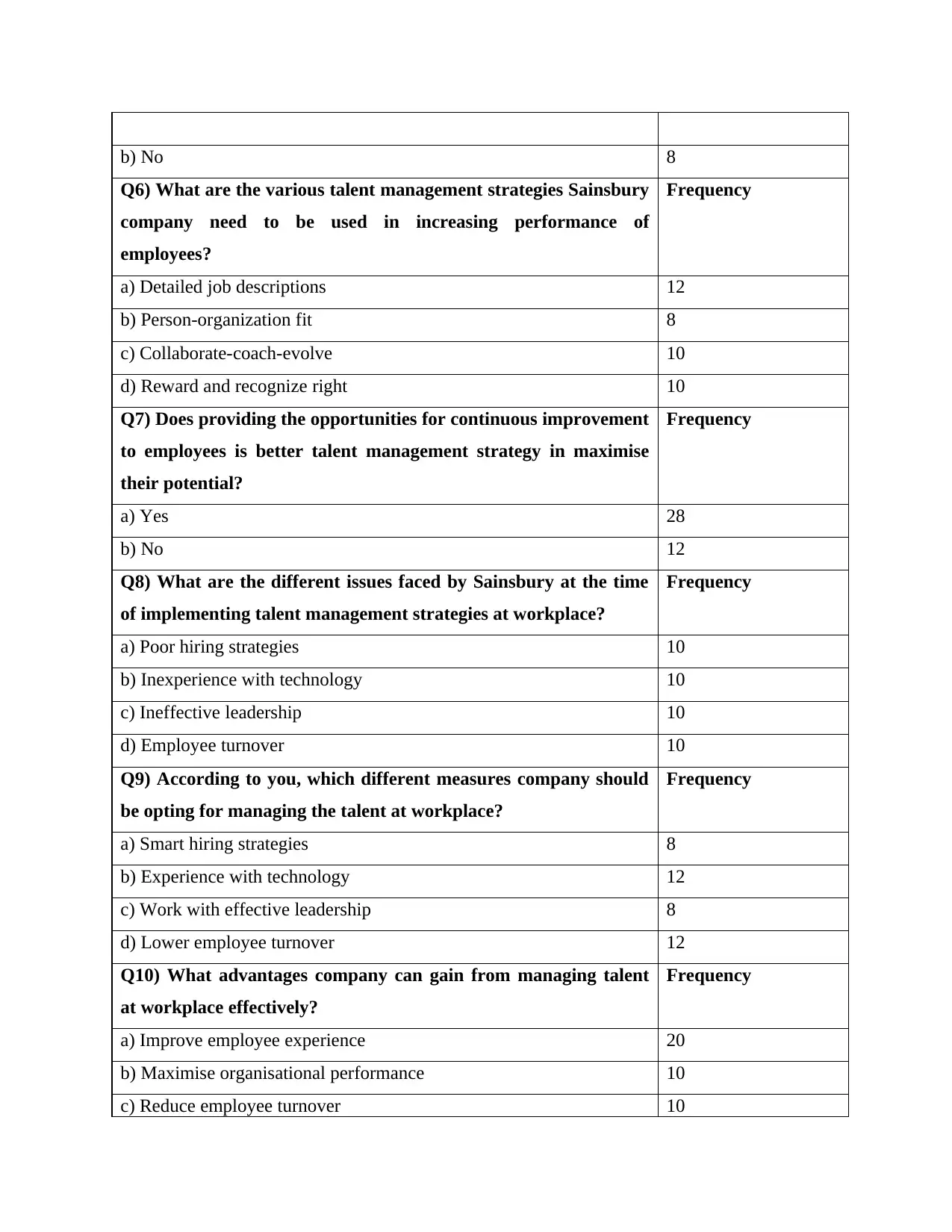
b) No 8
Q6) What are the various talent management strategies Sainsbury
company need to be used in increasing performance of
employees?
Frequency
a) Detailed job descriptions 12
b) Person-organization fit 8
c) Collaborate-coach-evolve 10
d) Reward and recognize right 10
Q7) Does providing the opportunities for continuous improvement
to employees is better talent management strategy in maximise
their potential?
Frequency
a) Yes 28
b) No 12
Q8) What are the different issues faced by Sainsbury at the time
of implementing talent management strategies at workplace?
Frequency
a) Poor hiring strategies 10
b) Inexperience with technology 10
c) Ineffective leadership 10
d) Employee turnover 10
Q9) According to you, which different measures company should
be opting for managing the talent at workplace?
Frequency
a) Smart hiring strategies 8
b) Experience with technology 12
c) Work with effective leadership 8
d) Lower employee turnover 12
Q10) What advantages company can gain from managing talent
at workplace effectively?
Frequency
a) Improve employee experience 20
b) Maximise organisational performance 10
c) Reduce employee turnover 10
Q6) What are the various talent management strategies Sainsbury
company need to be used in increasing performance of
employees?
Frequency
a) Detailed job descriptions 12
b) Person-organization fit 8
c) Collaborate-coach-evolve 10
d) Reward and recognize right 10
Q7) Does providing the opportunities for continuous improvement
to employees is better talent management strategy in maximise
their potential?
Frequency
a) Yes 28
b) No 12
Q8) What are the different issues faced by Sainsbury at the time
of implementing talent management strategies at workplace?
Frequency
a) Poor hiring strategies 10
b) Inexperience with technology 10
c) Ineffective leadership 10
d) Employee turnover 10
Q9) According to you, which different measures company should
be opting for managing the talent at workplace?
Frequency
a) Smart hiring strategies 8
b) Experience with technology 12
c) Work with effective leadership 8
d) Lower employee turnover 12
Q10) What advantages company can gain from managing talent
at workplace effectively?
Frequency
a) Improve employee experience 20
b) Maximise organisational performance 10
c) Reduce employee turnover 10
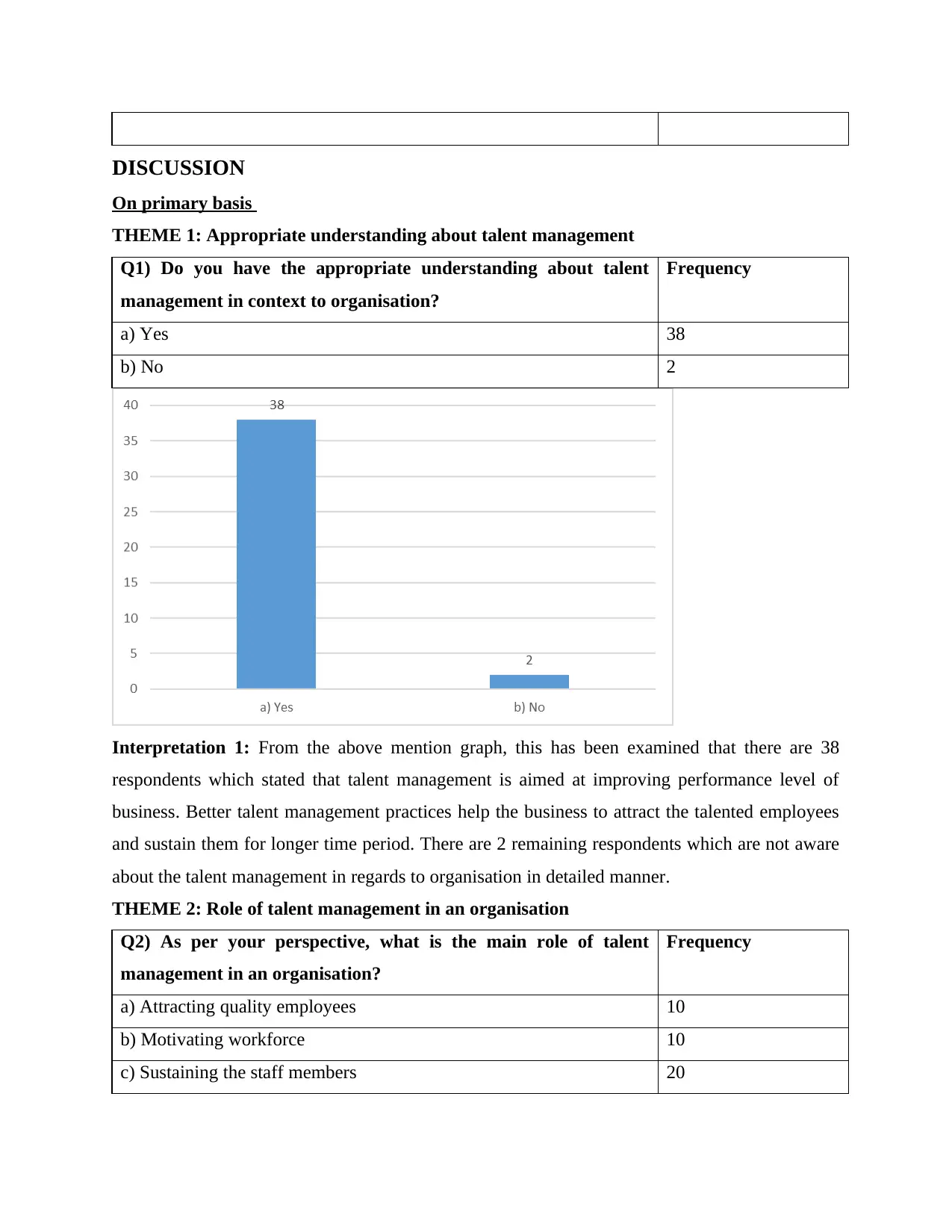
DISCUSSION
On primary basis
THEME 1: Appropriate understanding about talent management
Q1) Do you have the appropriate understanding about talent
management in context to organisation?
Frequency
a) Yes 38
b) No 2
Interpretation 1: From the above mention graph, this has been examined that there are 38
respondents which stated that talent management is aimed at improving performance level of
business. Better talent management practices help the business to attract the talented employees
and sustain them for longer time period. There are 2 remaining respondents which are not aware
about the talent management in regards to organisation in detailed manner.
THEME 2: Role of talent management in an organisation
Q2) As per your perspective, what is the main role of talent
management in an organisation?
Frequency
a) Attracting quality employees 10
b) Motivating workforce 10
c) Sustaining the staff members 20
On primary basis
THEME 1: Appropriate understanding about talent management
Q1) Do you have the appropriate understanding about talent
management in context to organisation?
Frequency
a) Yes 38
b) No 2
Interpretation 1: From the above mention graph, this has been examined that there are 38
respondents which stated that talent management is aimed at improving performance level of
business. Better talent management practices help the business to attract the talented employees
and sustain them for longer time period. There are 2 remaining respondents which are not aware
about the talent management in regards to organisation in detailed manner.
THEME 2: Role of talent management in an organisation
Q2) As per your perspective, what is the main role of talent
management in an organisation?
Frequency
a) Attracting quality employees 10
b) Motivating workforce 10
c) Sustaining the staff members 20
⊘ This is a preview!⊘
Do you want full access?
Subscribe today to unlock all pages.

Trusted by 1+ million students worldwide
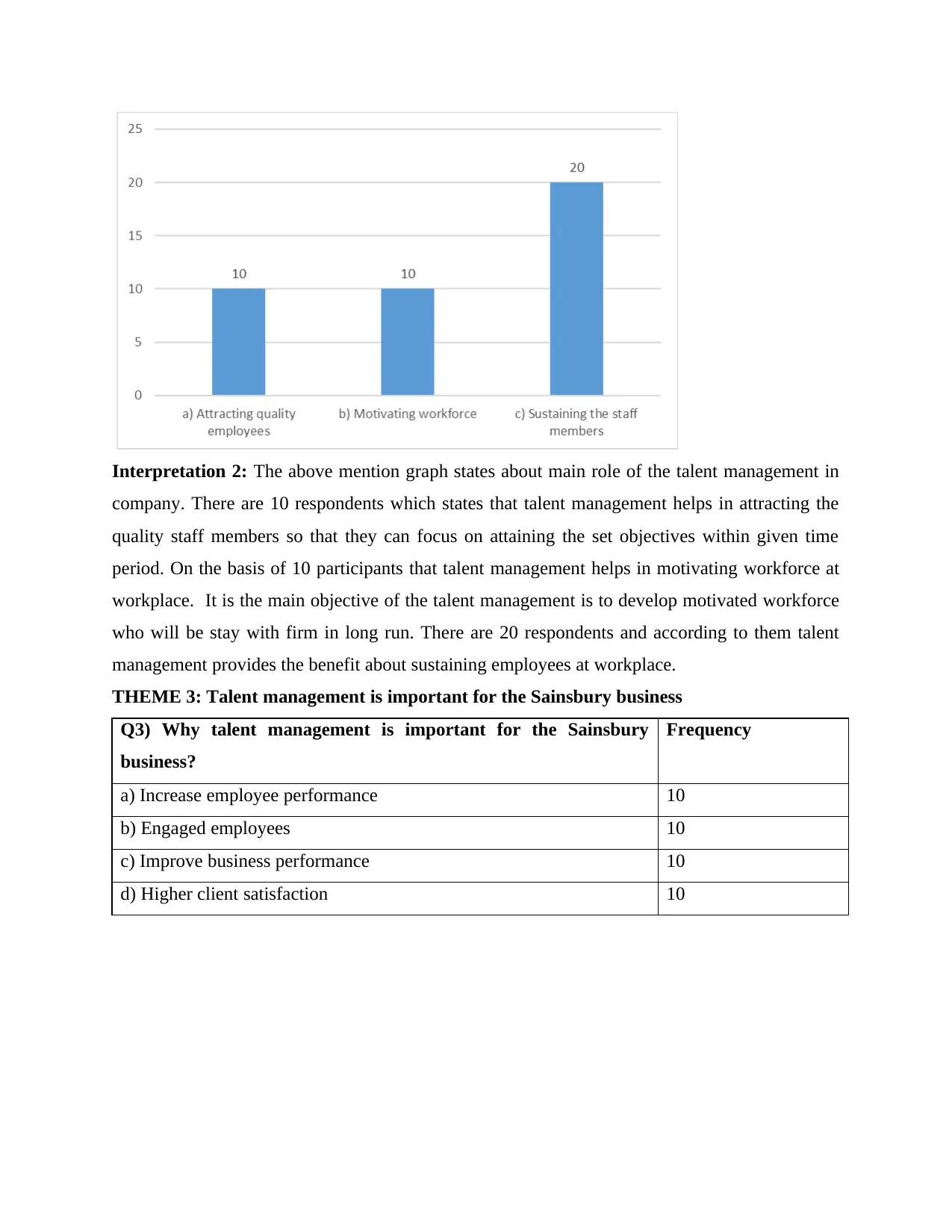
Interpretation 2: The above mention graph states about main role of the talent management in
company. There are 10 respondents which states that talent management helps in attracting the
quality staff members so that they can focus on attaining the set objectives within given time
period. On the basis of 10 participants that talent management helps in motivating workforce at
workplace. It is the main objective of the talent management is to develop motivated workforce
who will be stay with firm in long run. There are 20 respondents and according to them talent
management provides the benefit about sustaining employees at workplace.
THEME 3: Talent management is important for the Sainsbury business
Q3) Why talent management is important for the Sainsbury
business?
Frequency
a) Increase employee performance 10
b) Engaged employees 10
c) Improve business performance 10
d) Higher client satisfaction 10
company. There are 10 respondents which states that talent management helps in attracting the
quality staff members so that they can focus on attaining the set objectives within given time
period. On the basis of 10 participants that talent management helps in motivating workforce at
workplace. It is the main objective of the talent management is to develop motivated workforce
who will be stay with firm in long run. There are 20 respondents and according to them talent
management provides the benefit about sustaining employees at workplace.
THEME 3: Talent management is important for the Sainsbury business
Q3) Why talent management is important for the Sainsbury
business?
Frequency
a) Increase employee performance 10
b) Engaged employees 10
c) Improve business performance 10
d) Higher client satisfaction 10
Paraphrase This Document
Need a fresh take? Get an instant paraphrase of this document with our AI Paraphraser
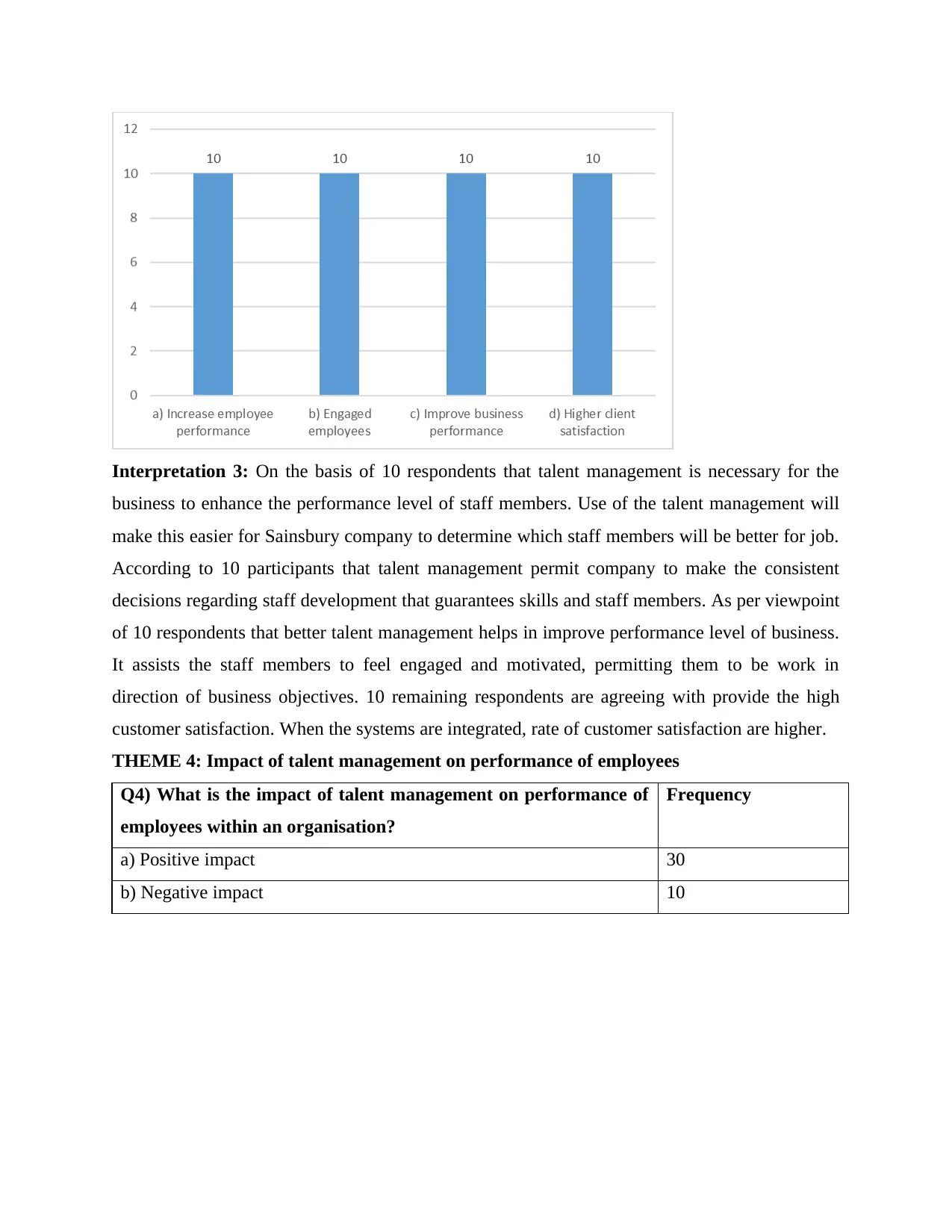
Interpretation 3: On the basis of 10 respondents that talent management is necessary for the
business to enhance the performance level of staff members. Use of the talent management will
make this easier for Sainsbury company to determine which staff members will be better for job.
According to 10 participants that talent management permit company to make the consistent
decisions regarding staff development that guarantees skills and staff members. As per viewpoint
of 10 respondents that better talent management helps in improve performance level of business.
It assists the staff members to feel engaged and motivated, permitting them to be work in
direction of business objectives. 10 remaining respondents are agreeing with provide the high
customer satisfaction. When the systems are integrated, rate of customer satisfaction are higher.
THEME 4: Impact of talent management on performance of employees
Q4) What is the impact of talent management on performance of
employees within an organisation?
Frequency
a) Positive impact 30
b) Negative impact 10
business to enhance the performance level of staff members. Use of the talent management will
make this easier for Sainsbury company to determine which staff members will be better for job.
According to 10 participants that talent management permit company to make the consistent
decisions regarding staff development that guarantees skills and staff members. As per viewpoint
of 10 respondents that better talent management helps in improve performance level of business.
It assists the staff members to feel engaged and motivated, permitting them to be work in
direction of business objectives. 10 remaining respondents are agreeing with provide the high
customer satisfaction. When the systems are integrated, rate of customer satisfaction are higher.
THEME 4: Impact of talent management on performance of employees
Q4) What is the impact of talent management on performance of
employees within an organisation?
Frequency
a) Positive impact 30
b) Negative impact 10
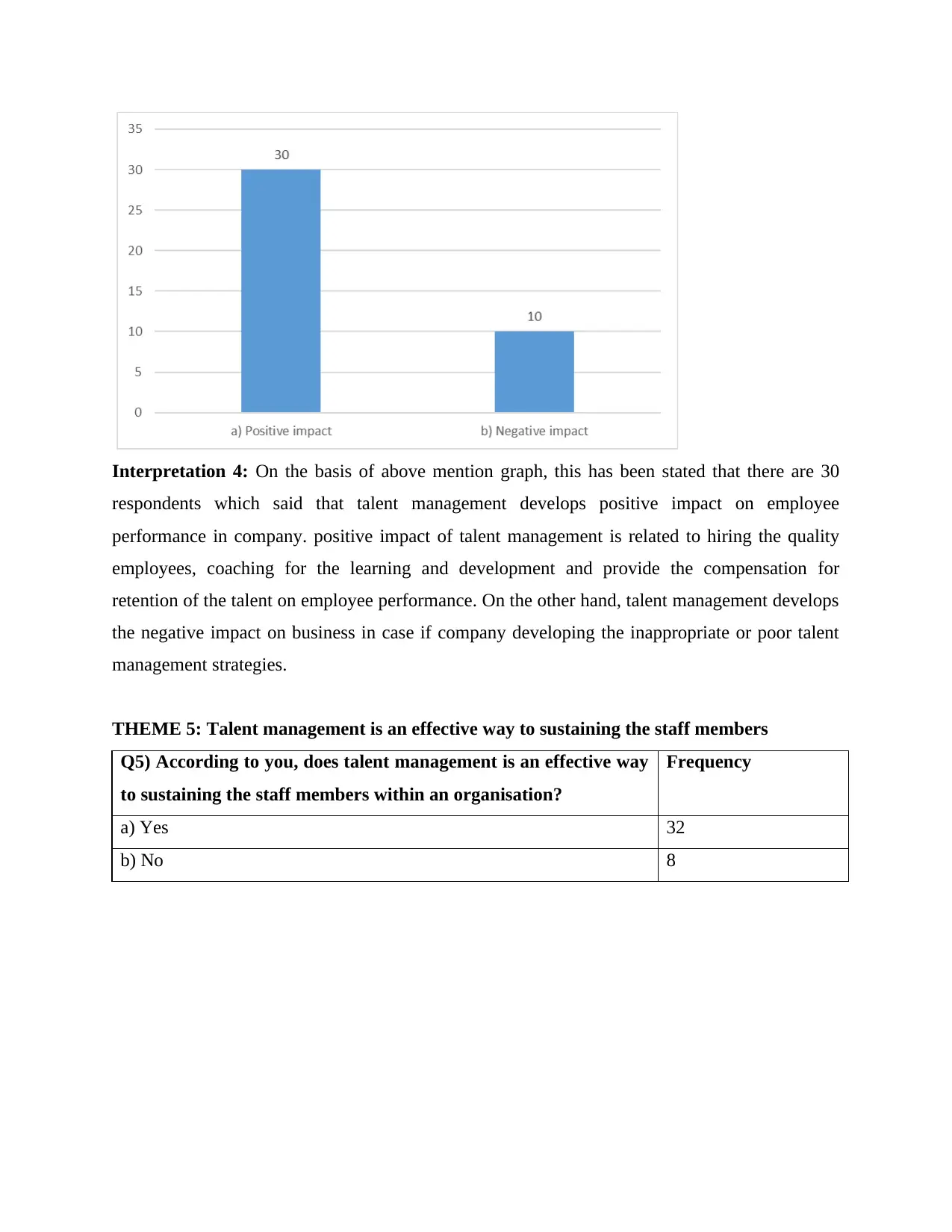
Interpretation 4: On the basis of above mention graph, this has been stated that there are 30
respondents which said that talent management develops positive impact on employee
performance in company. positive impact of talent management is related to hiring the quality
employees, coaching for the learning and development and provide the compensation for
retention of the talent on employee performance. On the other hand, talent management develops
the negative impact on business in case if company developing the inappropriate or poor talent
management strategies.
THEME 5: Talent management is an effective way to sustaining the staff members
Q5) According to you, does talent management is an effective way
to sustaining the staff members within an organisation?
Frequency
a) Yes 32
b) No 8
respondents which said that talent management develops positive impact on employee
performance in company. positive impact of talent management is related to hiring the quality
employees, coaching for the learning and development and provide the compensation for
retention of the talent on employee performance. On the other hand, talent management develops
the negative impact on business in case if company developing the inappropriate or poor talent
management strategies.
THEME 5: Talent management is an effective way to sustaining the staff members
Q5) According to you, does talent management is an effective way
to sustaining the staff members within an organisation?
Frequency
a) Yes 32
b) No 8
⊘ This is a preview!⊘
Do you want full access?
Subscribe today to unlock all pages.

Trusted by 1+ million students worldwide
1 out of 26
Related Documents
Your All-in-One AI-Powered Toolkit for Academic Success.
+13062052269
info@desklib.com
Available 24*7 on WhatsApp / Email
![[object Object]](/_next/static/media/star-bottom.7253800d.svg)
Unlock your academic potential
Copyright © 2020–2025 A2Z Services. All Rights Reserved. Developed and managed by ZUCOL.




